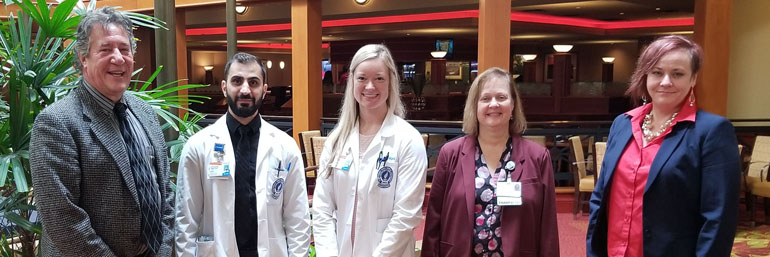Oct 12

The Person Comes First
For the second year, Christine Crish, Ph.D., assistant professor of pharmaceutical sciences, participated in The Person Comes First: A Dementia and Caregiving Symposium, held in suburban Cleveland under the auspices of Maplewood Senior Living in partnership with the Alzheimer’s Association, Benjamin Rose Institute on Aging and Northeast Ohio Medical University.
Along with Susan Fosnight, R.Ph., professor of pharmacy practice (photo, second from right), Dr. Crish (photo, far right) sat on a panel that presented information to an audience and answered audience members’ questions about the latest pharmaceutical research on dementia (Dr. Crish’s research) as well as medication management (Susan Fosnight’s focus). Also shown in photo: Panelist John Avolio, R.Ph. (far left) and fourth-year College of Pharmacy students Adib Farran and Veronica Violand.
The audience was composed mostly of caregivers for those with dementia — not necessarily limited to Alzheimer’s disease, but also dementia from stroke or Parkinson’s disease.
The event came about because the Neurodegenerative Disease and Aging research focus area at NEOMED has strong ties to both Maplewood and the Alzheimer’s Association, explains Dr. Crish:
“I’ve toured Maplewood’s memory care suites as part of an initiative to understand how assisted living facilities integrate research and technology into providing optimal care for AD patients, and the folks there have reached out to us faculty to participate in their educational seminars and symposia. As for the Alzheimer’s Association, we also have a strong relationship with this important national advocacy group. My lab and I recently sponsored a team (CCrish Neuro Lab) to participate in the Walk to End Alzheimer’s in Akron — which is one of the Alzheimer’s Association’s biggest yearly fundraisers across America.”
NEOMED’s relationship with the national agency grew even stronger this fall when Dr. Crish was appointed to serve on the Advisory Board of Directors for the Eastern Ohio Chapter of the Alzheimer’s Association.
“It’s a point of immense pride for me to serve along with these folks who work so hard to support patients, families, caregivers and research for AD,’’ says Dr. Crish.
“As a basic science researcher in AD, it’s important for me to see the end game — to see why we spend countless hours in the lab studying esoteric molecules and pathways and mechanisms. That end game is for the people who are devastated by AD. This is something I try to impart to my students — we need to appreciate the human aspect of why we do what we do. It makes all those grant rejections, hard paper revisions and failed experiments worthwhile.”

